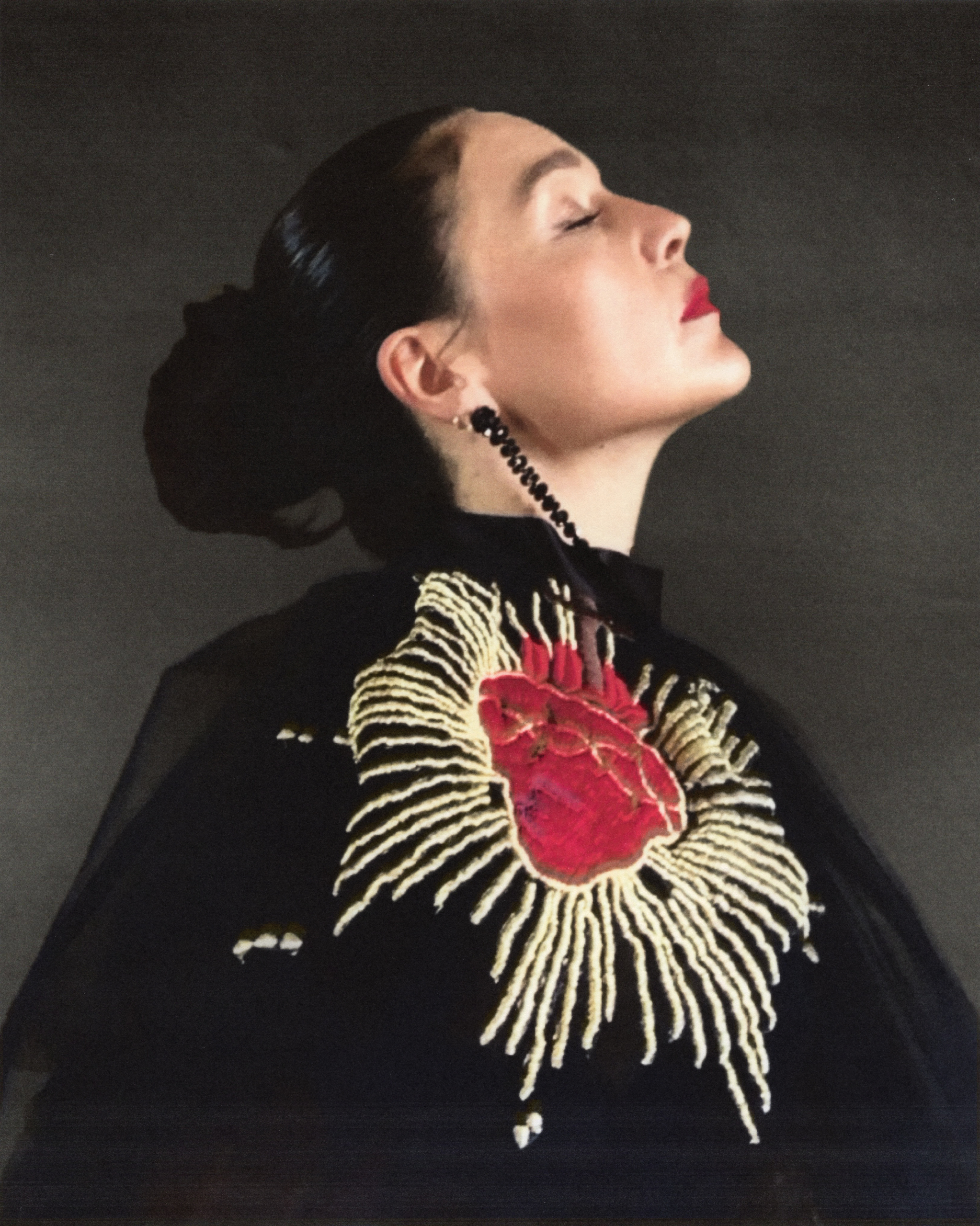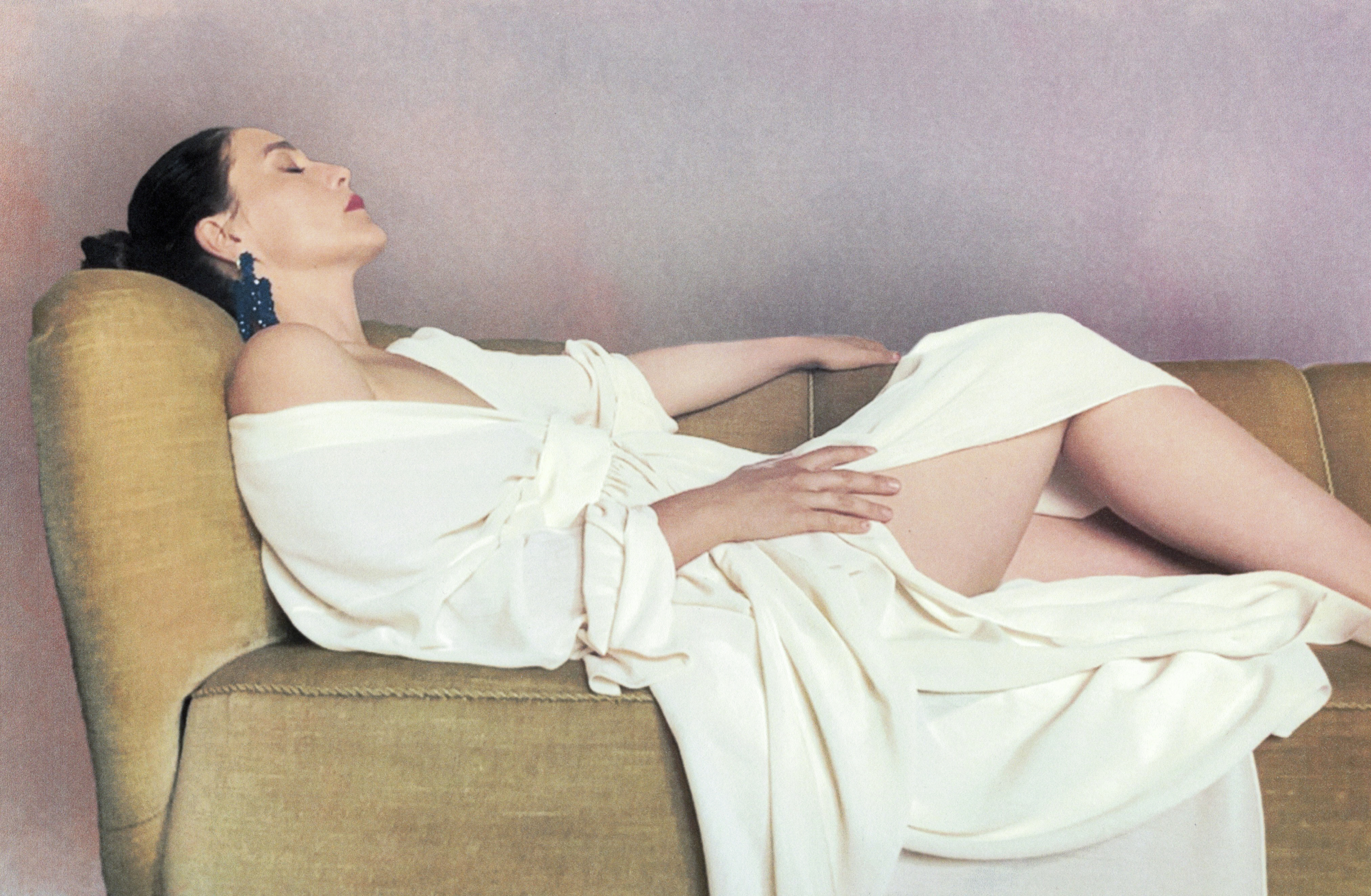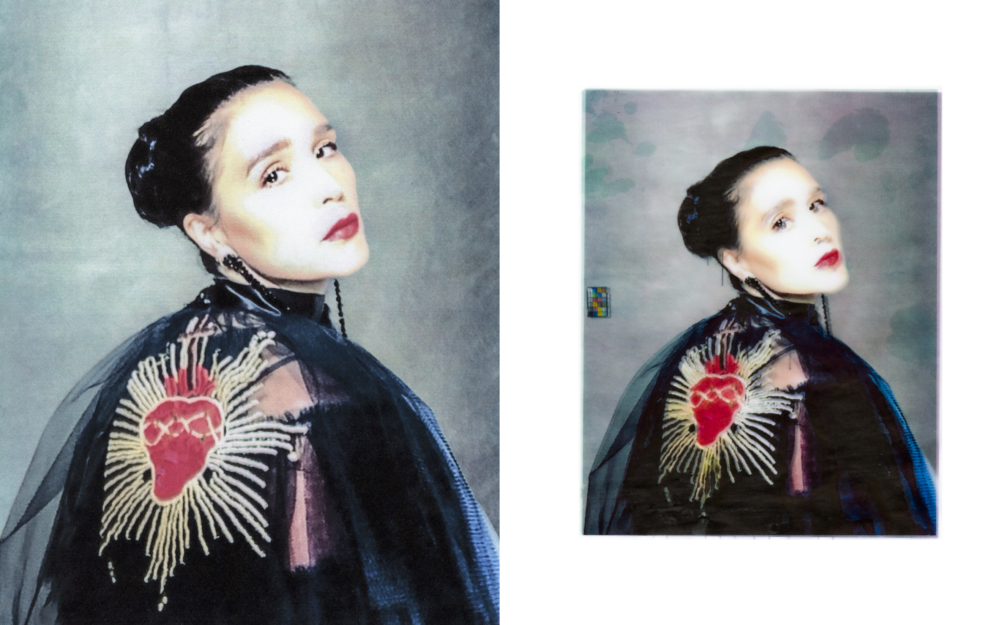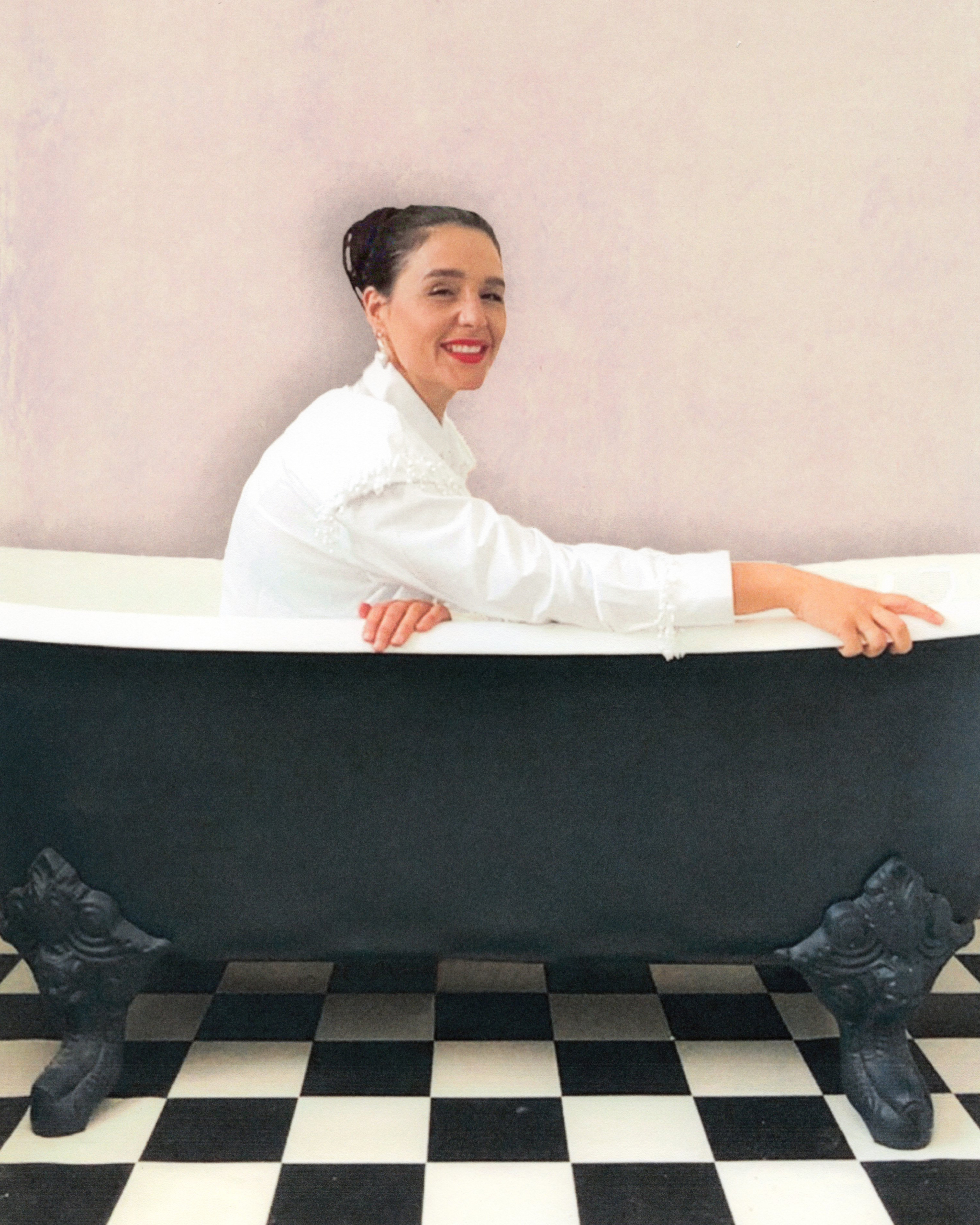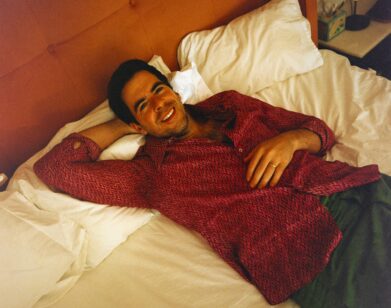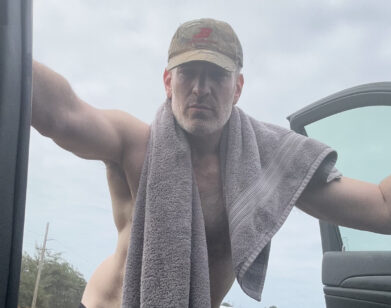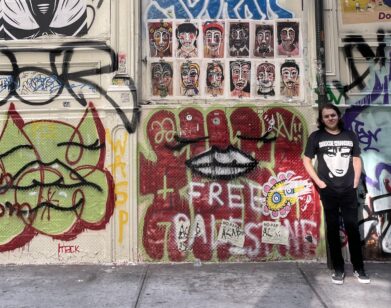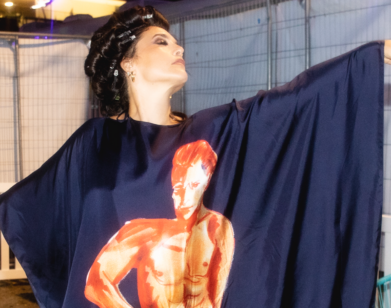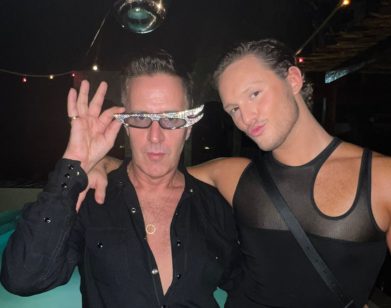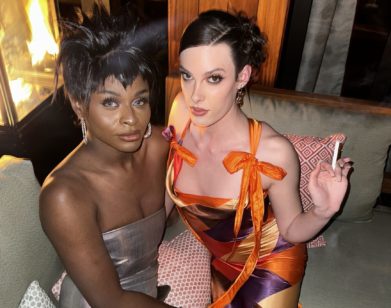Jessie Ware Tells Róisín Murphy About Her New Album: “I Want People to Want to Have Sex”
Jessie Ware’s last album, 2018’s Glasshouse, was a vulnerable exploration of motherhood, love, and the creeping pressures of adulthood. But for her latest record, What’s Your Pleasure?, Ware, who knows her way around a banger, returns to her comfort zone: the dancefloor. As Ware puts it, What’s Your Pleasure? is oriented around “escapist fantasy,” a mood that can also be found on her popular podcast, Table Manners, which she co-hosts with her mother Lennie. “The podcast makes people feel like they know me,” Ware says. “I don’t think that means they don’t know about my music, but they feel like it’s more of a connection.” With guests ranging from Vanessa Williams to Sam Smith, think of it as a fabulous dinner party equal parts gossip and booze. That same energy was tapped when the 35-year-old musician hopped on a Zoom call with the Irish dance-pop supernova Róisín Murphy, where they discussed the fluidity of pop stardom, parenting in lockdown, and music to have to sex to.
———
RÓISÍN MURPHY: Oh, you got your lippie on.
JESSIE WARE: Well, I just had to do some other shit. Actually, I’ve made a full effort for you, Roisin.
MURPHY: I’ve worn that shirt before.
WARE: It’s so good, isn’t it?
MURPHY: Gorgeous. Christopher Kane.
WARE: It’s on sale if you want it.
MURPHY: This could have turned into a whole clothing conversation because the black satin outfit it goes with is gorgeous. I love all the pearls.
WARE: It’s brilliant. You are, like, the fashionista queen. Some of those outfits that you’re wearing in those videos—the silver, what was it, catsuit?
MURPHY: That wasn’t expensive, though.
WARE: You’re just stylish. You’ve just got it. Some people don’t have it.
MURPHY: I’m certainly fairly slim at the moment, so I can slip into all sorts of costumes that I’ve had for who knows how long.
WARE: You haven’t been making sourdoughs and shit?
MURPHY: Smoking too much.
WARE: You just started up smoking again! You said it on Instagram.
MURPHY: It’s terrible.
WARE: But do you love it?
MURPHY: I don’t know that I love cigs.
WARE: Oh, okay. It’s weed. The other thing.
MURPHY: I do love weed. Especially when I’m writing, I just associate the two things very closely. Have you got a setup at home where you can record your own vocals?
WARE: We’ve been doing these Zoom podcasts. My mate who I work with lives down the road. He’s done this really amazing charity thing called “Pass This On.” He’s got loads of producers to collaborate and they start a beat and then they pass it on and the next person, and so on. Then they get vocals. So I got given a beat and I was like, “I don’t have a setup.” He just gave me a mic and I plugged it into my handy recorder, which I use for the podcast. And I was like, “Look, it’s going to be dry as fuck. I’ll send it to you.”
MURPHY: Can you fiddle with it?
WARE: It’s a bit of recording blindly, but I did it. So that’s about as close as I’ve got to recording in lockdown.
MURPHY: Did you do any training in singing or anything? Did you learn to sing?
WARE: Some classical. It’s helped me maybe, but I was never a classical singer. I had too much husk and I liked jazz music too much. So it was never going to really work.
MURPHY: I literally have never been able to construct harmonies until now. So it was a real mystery for me, harmony. It still is. But having been able to sit here and play with it with no stress, play with harmony, stacking up my track and my vocal tracks, it’s been mad.
WARE: Can I ask, with “Murphy’s Law,” how did you treat your vocal on that? Did you pitch it down slightly?
MURPHY: We pitched it down. We fiddled with that vocal for a very, very long time. Initially I sang it in a higher key and I said, “Put it into a lower key and I’ll re-sing it because maybe that’s the problem.” And we were never able to let go of that pretend-vocal.
WARE: But it’s really funny because on my new record I did the same, but I pitched mine up. I did the thing where we slowed down the track or I sang it low-key and then just tweaked it up. So I sounded a bit squeaky, but it’s funny.
MURPHY: Did you transpose the key down, too, when you sang?
WARE: I didn’t, but [the producer] James Ford did because he’s a genius. Is there still stuff that you’re doing with DJ Parrot?
MURPHY: I’m working on a few things at the moment, but that’s finishing off. He’s a bit moody about it. He always says it’s not good enough. But I worked with another guy, DJ Koze.
WARE: Oh, I love DJ Koze.
MURPHY: I like the way he works. You send him a vocal at like three o’clock in the day and he starts working on it at eight o’clock at night. And then he sends it to you at six in the morning.
WARE: Oh my god, that’s my dream. I’m so impatient. I don’t know about you, but for this record, I wanted to keep it really close. I wanted to only do it in London. Have you done the L.A. thing?
MURPHY: No. I didn’t ever go to L.A. to work in a studio. Overpowered was a real sort of journey around. We did Miami, New York, Philadelphia, Barcelona, London.
WARE: Sounds quite fun.
MURPHY: It was alright. First class all the way
WARE: It’s changed a lot. Hasn’t it?
MURPHY: I had that for that fleeting moment. I took it, but with both hands. I did what I wanted to do with it, so it was fun.
WARE: It was a different time and I think there was probably more money being spent willy nilly, but also you were a huge star.
MURPHY: I was super lucky to get that opportunity and get that amount of money to spend doing exactly what I wanted to do. Then again, there’s the other way of working, which you’re talking about, and it’s something that you have to return to regardless. To your roots and your beginnings. There will always be people in my life and there will probably always be people in your life that you can play your music to and you can go back to, and they’re just as important as the people you make the music with.
WARE: Absolutely. You can count those people on one hand. They’ll all give you a different opinion, but they don’t have that agenda that maybe a record label or someone else has. I always collaborate. I rely on it, like you. We can’t do all the other stuff, but I feel like we both know what we want. Collaboration has always been key to my projects, but I felt like potentially, some of the projects could get diluted from going around to big names. I feel like I’m getting far more confident the further along I go in this career. The more mistakes I make, it just makes you more sure of the music you’re making.
MURPHY: Is there any such thing as a mistake?
WARE: No, probably not. All happens for a reason.
MURPHY: If you’ve been around a while, things that seem like mistakes start to turn out like they weren’t mistakes. Being collaborative and having the freedom of not actually being Oasis, you have this freedom to just launch off on every new project, in a new direction.
WARE: Everyone’s so quick to want to define you. You kind of emerged on this accident but it became this global hit. It was a dance tune that crossed over to make you basically a pop star.
MURPHY: Well, I think it made the song a pop star, in a way. Jessie, brilliant record. I listened to it.
WARE: Really, do you like it?
MURPHY: I loved it. It’s superb.
WARE: I just wanted people to dance and kiss.
MURPHY: Cohesiveness is hard to hold onto. When I went in to make Overpowered, I was like, “I want to make records in the structure of building a pop record.” I didn’t assume for a minute that that meant that I wouldn’t be in control of it. I did take control of it, rightly or wrongly. You have to be very focused then and very bossy to keep the thing cohesive.
WARE: You say bossy, but I feel like you don’t get called bossy if you’re a man, do you? Anyway, that’s a separate thing.
MURPHY: You don’t normally make records like this if you’re a man. I can think of more female artists who write and are involved in the production, and they’re solo artists that are very creative and dominant in their work.
WARE: I don’t know whether I become less and less, not vain, but nervous around my vocals. I quite like people to fuck it up. It doesn’t need to always be pretty, it needs to just capture the right moment. But I feel quite tentative about saying that I’ve made a disco record because I feel like I’m learning so much about the genre. It’s not just disco. it’s dance, it’s house, it’s soul.
MURPHY: It’s very soulful. It’s not about trends. You do what you want to do and what you feel.
WARE: When I was thinking about touring this record, I definitely loved the fact that it could be live. I feel like people are becoming less and less precious about having the band.
MURPHY: I would never give up the band. A lot of people hear live music, it’s too much for them to take in. I’ve been at festivals where we’ve played what I would consider to be a sublime live set. It’s gone down well, and then a man comes out and presses play on some pretty decent tunes. The whole place goes absolutely out of the shit-box mad.
WARE: When I was deciding how to promote, I didn’t want to say no to shows, because I love performing. So, I thought, in that sense, as you say, the bloke goes on, he plays the records. I was thinking about doing that maybe with two backing singers to fit and bring that to life. I was trying to navigate these different scenarios where you could just go to a club and just press play. I’ve seen how you perform live, you give everything. When I make a record, it has to be me adoring it and being proud of it, but also with my audience and my fans, who’ve become my friends. You think about them, you think about how they can react.
MURPHY: I’m making dope reggae at the moment. At the label, they were like, “What about your gay fans?” And I was like, “What about them?”
WARE: They probably love it. I need to hear this. Do you feel like it gets better?
MURPHY: Absolutely, 100 percent. The more fears that you face, things that don’t come true, nobody gives a toss or all that.
WARE: Hold on, my daughter’s obviously knowing that this is an important chat and wants to include herself. Now I need to get her the chocolate. Honestly, Roísín, the parenting that I’m doing in this lockdown, it’s questionable. How are your kids?
MURPHY: Better than I would have thought. They’re older than yours. I start singing and they go, “Please stop singing.”
WARE: I’m like, “People pay good money for this. This is so rude of you.”
INTERVIEW EDITOR: If I could interject for a minute, I want to ask this last question to each of you: Jessie, you’re nearing the release of your album and, Roísín, you have an album coming out in August. What do you hope that people take away from this music?
WARE: For me, I want there to be an element of escapism and fantasy, and that’s what I was writing when I was making it. I wanted that to take me away to an imaginary place and an imaginary situation, which I think lots of people can relate to right now. I want people to feel sensual. I want people to want to have sex, even if they can’t have sex.
MURPHY: You dirty tramp.
WARE: Oh, fuck off. It takes one to know one.
MURPHY: Oh, God, you’re definitely not Catholic, girl.
WARE: It’s full of innuendos. Hopefully, people can look forward to that moment, whether they’re chatting to somebody on Hinge or Grindr or whatever. My song “Save The Kiss” accidentally became far more poignant during the lockdown saying, “Wait there, I’ll be there with that kiss.” Optimism and escapism. That’s what I think is what I’d like them to feel.
MURPHY: This album will be more singles than any album I’ve ever had. Potentially, it will have, at the end of the day, seven singles on it. What is supposed to mean to people? Just that I’m brilliant, basically.
WARE: Which you are. I think that’s confirmed.

